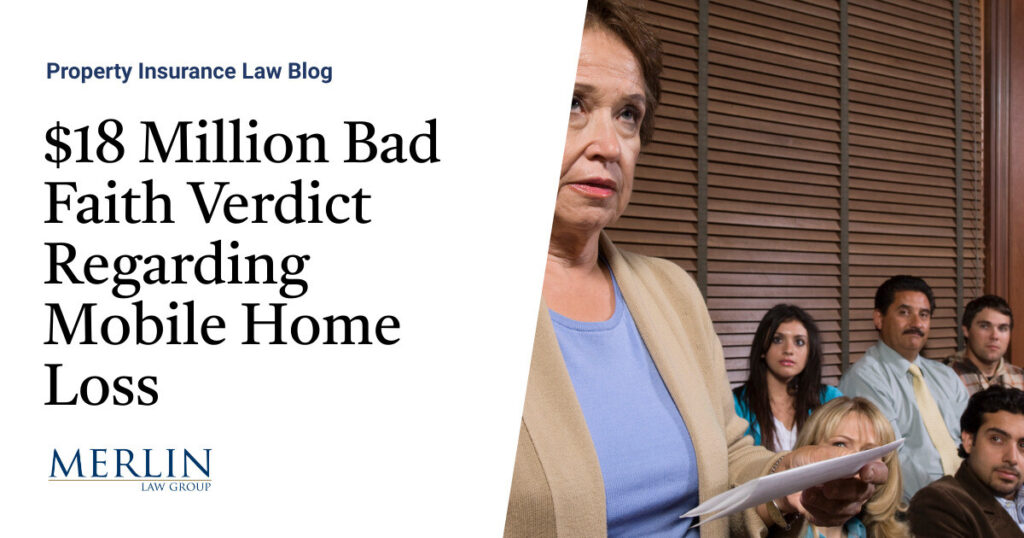$18 Million Bad Faith Verdict Regarding Mobile Home Loss

A California jury issued an $18 million verdict for failure to act in good faith regarding a property damage claim for $140,000 to a mobile home. After four years of delay, upset, unnecessary litigation, and false insinuations of fraud, the insurer paid the policy limit of $140,000. The case went to trial on extra-contractual damages for the insurance company’s failure to act in good faith.
The insureds, two sisters, resided in a modest and well-maintained modular home. Their home was damaged in the Valentine’s Day flood of February 14, 2019. They were in the house during the flood and promptly reported a covered loss due to their foresight in purchasing a flood endorsement. The insurer initiated a complex claim process, which resulted in unfounded fraud allegations, including examinations under oath. The insureds, who already had mental health issues, testified that their conditions worsened due to the claim handling. While American Reliable paid the policy limit for the dwelling coverage before the trial, the insureds had to live in an unrepaired, unsafe house for four years.
While attorneys for the insurers argued that their clients’ actions were reasonable, the jury obviously disagreed. American Reliable, a subsidiary of Global Indemnity, issued the policy. American Reliable appeared to be a paper entity insurance company with no employees. Global Indemnity’s employees handled the claim. American Reliable’s assets were low compared to Global’s, but the court allowed evidence of both companies’ net worth.
Elliott Flood was the expert witness in the case. While I do not have Flood’s report from this case, I am aware that Flood filed an expert report regarding Frontline Insurance on a Hurricane Irma loss where he stated in part:
‘The insurance buyer does not know the true value of the product until there is a loss and the claim is made and adjusted… Prior to buying an insurance policy, the consumer has the power to shop among various insurance companies. However, once the insurance policy is bought and a loss occurs, the consumer must deal with one insurance company. This creates an imbalance of negotiating power at a time when the consumer’s needs are greatest.’
…
Elements of Good-Faith Claim Handling. These are some of the primary elements of good-faith claim handling:
Thorough, timely, and unbiased investigation
Complete and accurate documentation
Fair evaluation
Good-faith negotiation…
…
‘The primary [job] duty of the claim representative is to deliver the promise to pay. Therefore, the claim representative’s chief task is to seek and find coverage, not to seek and find coverage controversies or to deny or dispute claims.’
In that expert report, Flood quoted State Farm CEO Edward B. Rust, Jr’s Keynote Address at the International Conference and Annual Meeting of the Association to Advance Collegiate Schools of Business in San Francisco on April 21-23, 2005:
If there’s any business where integrity is critical, it’s the insurance business. After all, you pay us money—a good deal of money—and we give you a piece of paper with a promise on it. You trust us to have the money to pay your claim when you have one. And you trust us to pay you fairly and promptly. We need that kind of trust for our system to work.
My bet is that the claims executives at Global Indemnity will be asked, “What happened?” and thinking about these obligations when reporting to senior management.
A newspaper article reporting on the case and verdict, Jury Awards California Sisters $18 Million From Insurance Company That Offered Only $5,000 For Storm Damage, noted the following:
Garnier and Toft, according to the suit, gave their insurance company, Arizona-based American Reliable, timely notice of the damage, and American Reliable had an inspection done at the property. But the claims adjuster, according to the lawsuit, underpaid the claim.
Water and mud in the home’s crawlspace destroyed the heating and air conditioning system and damaged the electrical system, leaving much of the house without electricity. Cracks began appearing on walls throughout the home, Hernandez said in a news release.
Garnier and Toft subsequently sued American Reliable Insurance Co. and its parent company, Global Indemnity, for breach of contract and breach of good faith and fair dealing. Global Indemnity paid out only $5,000 on the sisters’ claim, even though Garnier and Toft had provided contractor estimates that repairs would cost more than $100,000.
.. the siblings were forced to live in their home without heat for about five years while they battled their insurance company in court. However, in October 2023, Global Indemnity paid the sisters $140,000, the full amount of their policy, claiming the insurance carrier was previously unaware that Garnier and Toft had been living without heat. The company maintained it was an oversight that their insurance adjuster missed…
During the trial, defense attorneys argued that Garnier and Toft were difficult to communicate with because they insisted everything had to be in writing and that they would not talk on the phone…
The case seems to be a worthy study. I will report more on it as our law firm’s talented law librarian, Jennifer Dabbs, obtains more records from the docket. Hopefully, we will have Elliot Food’s expert report for this particular case to shed more light on the practices that led to this huge award.
Thought For The Day
The evil that is in the world almost always comes of ignorance, and good intentions may do as much harm as malevolence if they lack understanding.
—Albert Camus







